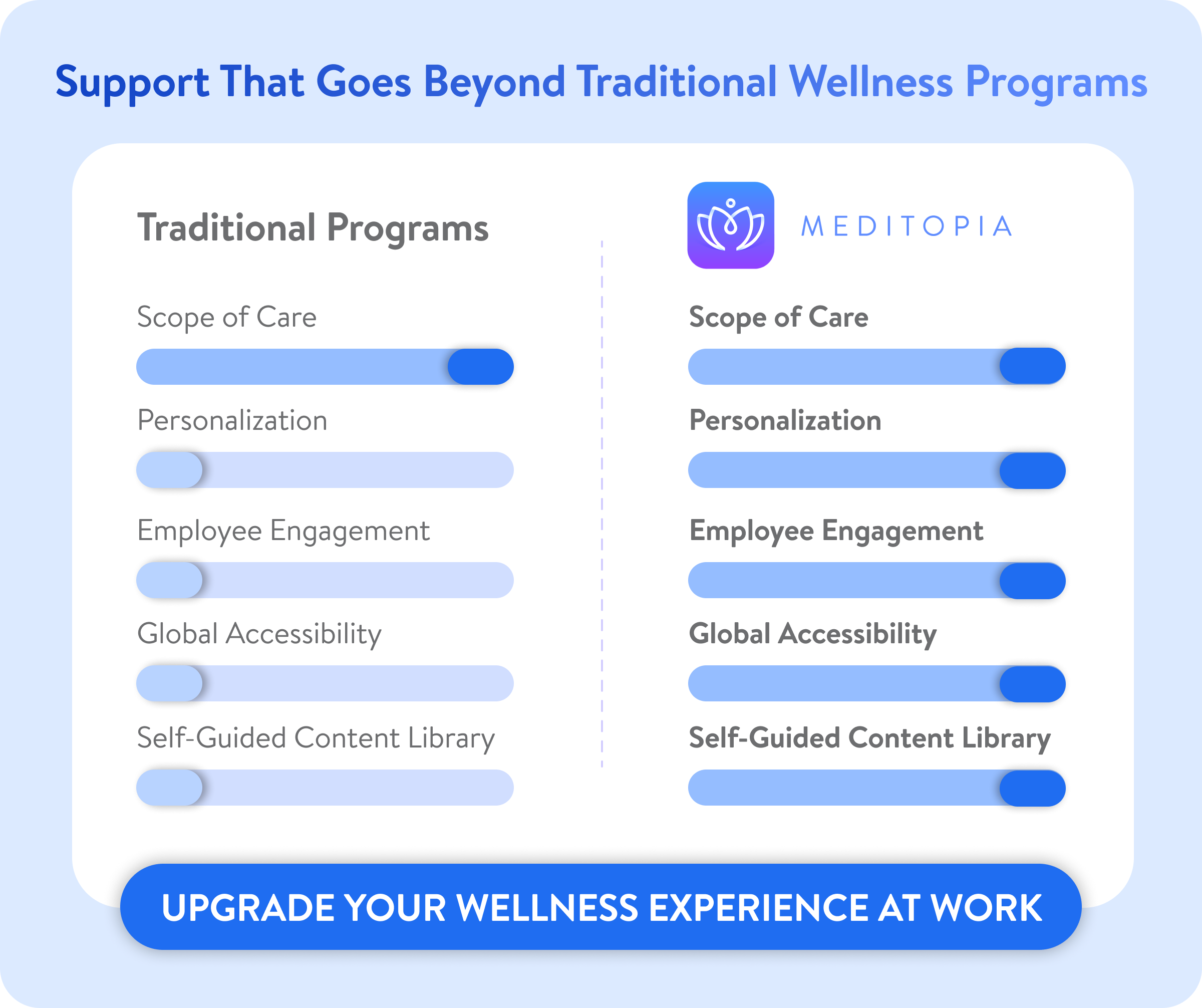With 70% of employees reporting that their mental health impacts their productivity, according to the American Psychological Association [1], businesses shouldn’t treat psychological support as optional. So, how can HR leaders meet these new demands and implement effective mental solutions for business that actually work? Let’s explore what makes digital mental health tools so essential in the modern workplace, and which platforms are leading the way.
Why Digital Mental Health Support Matters at Work
Today’s workforce expects mental health support that’s not only effective but also accessible, private, and flexible. That’s where digital solutions come in. They bridge the gap between outdated models and modern workplace demands, offering tools that work as hard and as smart as your teams do.
Here’s why digital solutions are becoming the go-to for many organizations:
- The mental health crisis is real: According to the World Health Organization [2], depression and anxiety cost the global economy over $1 trillion each year in lost productivity. Digital apps can help bridge care gaps and reduce the toll on both people and profits.
- Hybrid and remote work have changed everything: Loneliness, blurred work-life boundaries, and screen fatigue have increased the need for on-demand access to mental health tools for employees, tools that fit into their lives, not just the office.
- Traditional solutions often fall short: Legacy EAPs are typically underutilized, with engagement rates as low as 5%, a result of being outdated, difficult to access, and sometimes stigmatized. In contrast, AI-powered mental health solutions and mobile mental health tools boast usage rates between 25–40%, according to multiple digital mental health companies [3].
- Employees want privacy and autonomy: Digital platforms allow self-guided therapy, virtual counseling, and in-app support, which make it easier for people to seek help confidentially, especially in high-pressure work environments.
7 Best Digital Mental Health Platforms for Employees
The digital mental health landscape is expanding rapidly, with a range of platforms tailored for different company sizes, cultures, and regional needs. Below is a closer look at some of the leading digital mental health companies (including mental health tech startups and enterprise-level platforms) each offering unique ways to support employee mental health.
1. Spring Health
Spring Health is one of the most advanced digital mental health platforms in today’s market, designed for organizations that prioritize measurable outcomes.
With its AI-powered precision mental health model, it offers fast, personalized support to employees. It's particularly strong in data-driven decision environments and companies looking for scalable, evidence-based care.
2. Meditopia for Work
Meditopia for Work is a science-backed, all-in-one solution designed to make mental health support inclusive, continuous, and deeply personalized.
With a unique blend of AI-powered mental health tools, 1:1 counseling, and over 10,000 culturally adapted content pieces, it's also a clinically validated platform, delivering measurable emotional outcomes for diverse teams, like a 20% increase in positive emotions, and 30% stress reduction in 8 weeks.

3. Modern Health
Modern Health takes a holistic approach to employee mental health, combining therapy, coaching, and self-guided content into one unified platform. It places a strong emphasis on diversity, equity, inclusion, and belonging (DEIB), making it a popular choice for companies that want culturally relevant care at a global scale.
4. Lyra Health
Lyra Health brings clinical-grade mental health services to the workplace. By blending in-person and virtual therapy with seamless digital experiences, Lyra supports a wide range of employee needs, from mild stress to chronic conditions.
5. Spill
Spill integrates mental health directly into your team’s daily workflow. Built for Slack, it makes emotional support easy, discreet, and fast to access, ideal for teams working in digital-first or hybrid environments.
6. Nilo Health
Nilo Health is one of Europe’s most promising mental health tech startups, offering localized, preventive care for modern workplaces. With a focus on early intervention and multilingual services, it helps small and mid-sized companies across Europe build sustainable mental wellbeing initiatives without breaking the bank.
7. SonderMind
SonderMind addresses one of the biggest gaps in mental health care: fast, covered access to licensed professionals. Its US-focused network connects employees to providers within days and integrates with some insurance.
What to Look for in a Digital Mental Health Solution
Not all digital mental health tools are created equal. After considering what your team needs, you should look for an affordable yet comprehensive alternative, flexible enough to support your team exactly the way they need it. Here are the key factors to consider:

- On-Demand Access: Ensure the platform offers 24/7 availability, especially important for global teams, shift workers, or remote employees who need support outside typical office hours.
- Multilingual and Localized Support: Look for tools that provide services in multiple languages and culturally appropriate content, which is an essential for multinational organizations and diverse teams.
- Comprehensive Service Offering: The best tools combine various services in one place: therapy, mindfulness, self-guided therapy, virtual counseling, meditation programs, and in-app support.
- AI-Powered Personalization: Some platforms use AI to assess needs, guide users to the right support, and deliver tailored content. These AI-powered mental health solutions can significantly improve engagement and effectiveness.
- Privacy and Confidentiality: Ensure the solution complies with GDPR, HIPAA, and other local data protection standards.
- Integration with HR Systems: Tools that integrate with your HRIS or benefits platform can streamline onboarding, track utilization, and improve visibility without additional manual work.
- Analytics and ROI Tracking: A robust analytics dashboard should show real usage, engagement trends, and emotional impact.
Digital vs. Traditional Mental Health Support
As companies reconsider their mental health offerings, the question often arises: should we invest in digital or stick to traditional in-person support? The truth is, both have their place, but for scalability, accessibility, and cost-efficiency, digital solutions often offer distinct advantages, especially in today’s hybrid work environment.
Here’s a side-by-side comparison:
While traditional support may be critical for certain high-risk or clinical cases, digital mental health tools make it possible to build a proactive, preventative culture of care, without waiting lists or high overhead.
Who Should Consider Digital Mental Health Tools?
Whether you're managing a distributed tech team or leading a fast-growing startup, there’s likely a solution tailored to your specific needs. Here’s a breakdown of who benefits most and why:
- Remote Teams: Rely on mobile mental health tools that are accessible anytime, anywhere, and allow confidential check-ins in distributed settings.
- Startups and SMEs: Need affordable, plug-and-play options. Many digital apps for mental health offer flat-rate or per-user pricing with minimal setup.
- Large Enterprises: Require scalable, multilingual solutions with centralized analytics to manage wellness across regions and roles.
- Hybrid Workplaces: Benefit from flexibility and omnichannel access, combining app-based services with optional live coaching or webinars.
High-Stress Industries (e.g., healthcare, finance, FMCG, retail, and customer service): Often prioritize fast access to care, burnout prevention, and always-on crisis support.
























